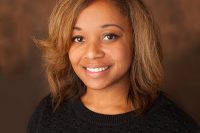By Tatum Lyles Flick
Communications Specialist
Assistant Professors Julia Steed, PhD’18, MSN’10, and LeTizia Smith, DNP, MSN’07, were selected for a Vanderbilt University Sesquicentennial Grant for “Project SHARE: Sharing Strategies for Academic Faculty and Student Recruitment.” The project will evaluate new ways to recruit and retain faculty and students of color in Vanderbilt’s graduate health science programs.
“We want to advance opportunities for underrepresented minorities who have interest in health care or interest in teaching others in health care disciplines,” Steed says. “Ultimately our goal as health care providers is to improve the health and the quality of life of our patients.”
Project SHARE will build health-science collaborations across the university through monthly meetings, assessments of national trends, engaging speakers and building a community of people devoted to diverse recruitment.
One of the first speakers will be Rosevelt L. Noble, PhD’03, BS’98, director of the Bishop Joseph Johnson Black Cultural Center at Vanderbilt, president of the Black Faculty and Staff Association and senior lecturer in sociology.

Noble will help the group follow a similar process to his year-long Teaching While Black program, which helped Black faculty and instructors navigate challenges and make the most of available resources. He will also serve as a mentor in helping the SHARE group better understand student needs.
“I work daily with marginalized populations,” says Noble, who has been at Vanderbilt for 28 years in a variety of roles as undergraduate student, graduate student, faculty and staff. “I see students all the time and know the issues that they face, especially with staying in health care. We want to know how we best help them get over hurdles and stay on the career path they have chosen.”
While the SHARE project helps recruit and retain diverse students and faculty in a variety of VU schools and programs, Smith and Steed hope that it will contribute to increasing diverse health care faculty and students at Vanderbilt. The ultimate goal is to educate nursing professionals who are ready to serve an increasingly diverse US population in culturally competent ways.
“People usually have better health care outcomes when they’re treated by someone who looks like them,” Smith says. “Right now, most health care providers are white men and women, and that’s not indicative of the rest of the population. This is one place where we can start to improve the health care outcomes of Black and Brown communities.”

The program leaders also hope that increasing representation of Black and brown students and faculty will lead to new, more inclusive, ideas for health care research.
“A lot of students take themselves out of the competition before they even enter it,” says Steed, explaining some of the hurdles she’s found that prevent more diverse students from applying to Vanderbilt. “They think that they don’t qualify, that Vanderbilt is too prestigious, or that their competency or academic background would disqualify them.”
Once students and faculty from diverse backgrounds are recruited in higher numbers, Steed and Smith hope Project SHARE will step in to support retention.
“Once we get folks in the door, we have to support them,” Steed says. “Students from underrepresented minority groups often need additional academic and financial support, mentoring or tutoring, and faculty can benefit from professional development.”
In the near future, Steed and Smith plan to invite leaders of Vanderbilt health science programs across campus to collaborate as part of Project SHARE.
“It’s the hope that Vanderbilt becomes a school that’s doing it right, where it’s the place that people think about when they think about diversity, equity and inclusion,” Smith says. “We want to set the standard for health care and universities as a whole. I think we’re in a position to become the gold standard of how it’s done.”